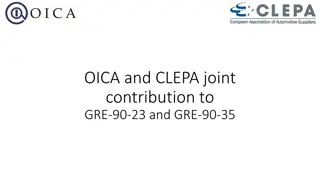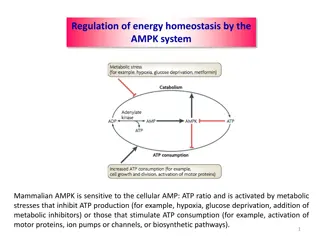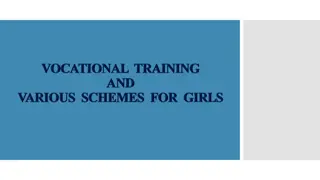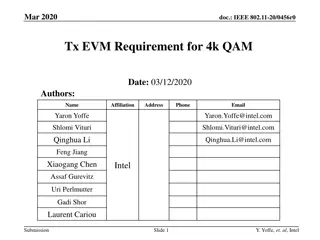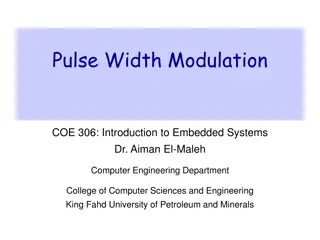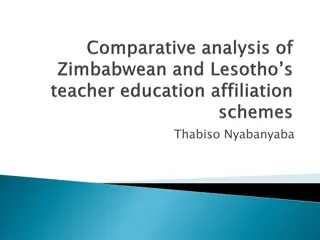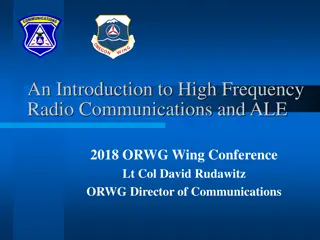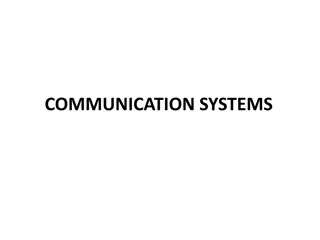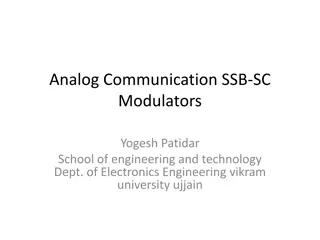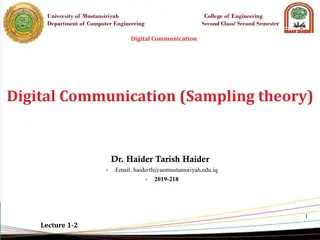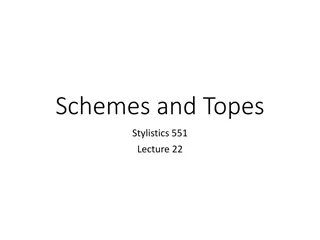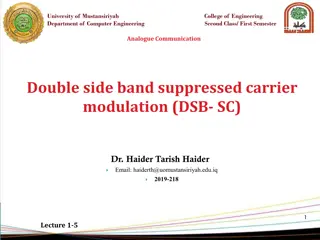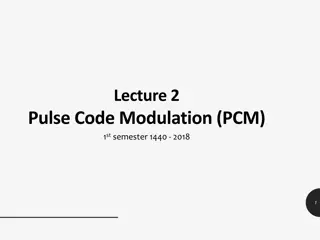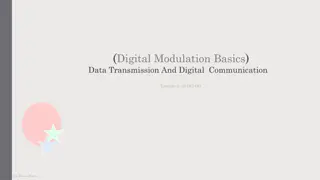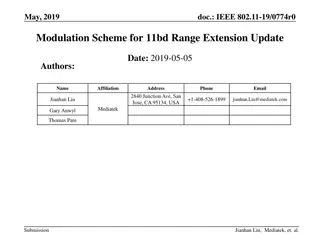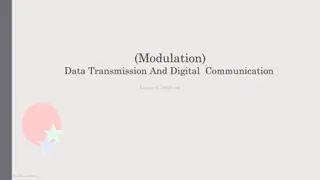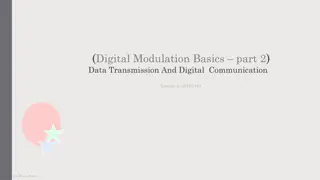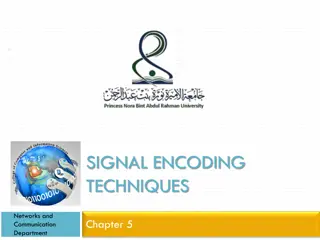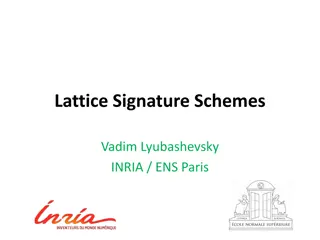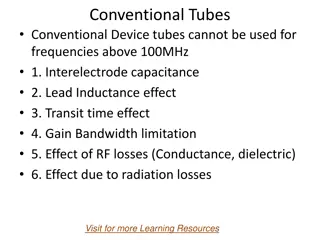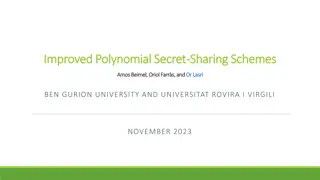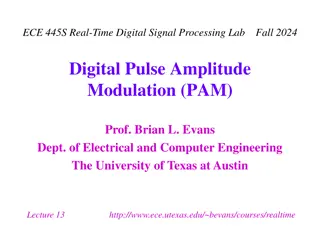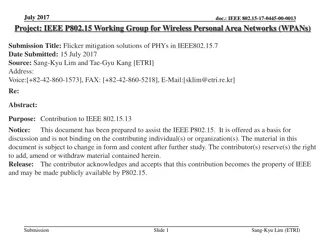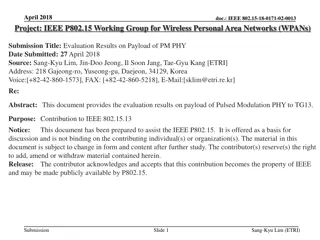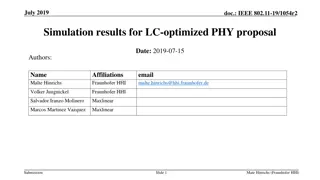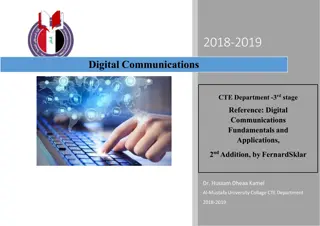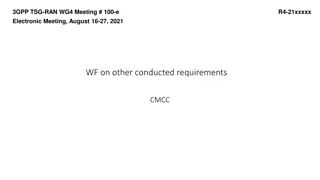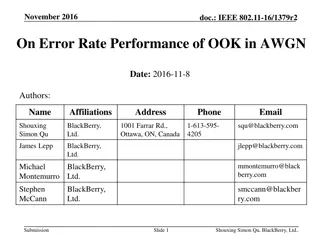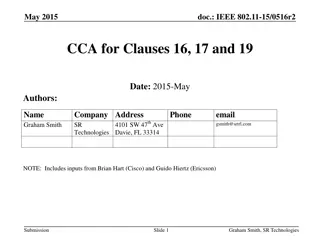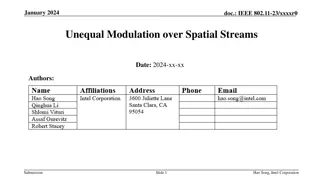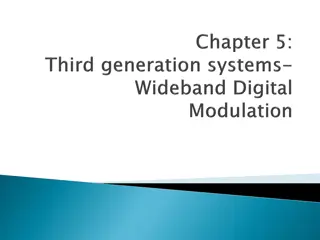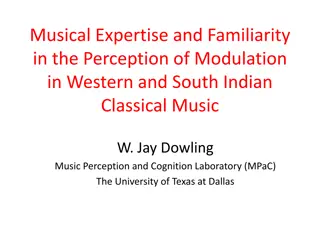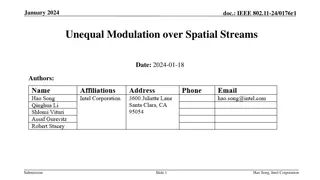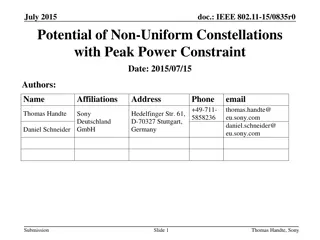Export Facilitation Schemes for Small and Medium Exporters in Sialkot Region
Explore the 2021 export facilitation schemes by the Collectorate of Customs in Sambrial, Sialkot, focusing on manufacturing bond rules, simplification through a single administrative document, eligibility criteria, and categorization of traders under the scheme. The schemes aim to increase accessibi
0 views • 31 slides
Understanding Voluntary Sustainability Schemes: ISCC and REDcert
Explore the principles and methods of Voluntary Sustainability Schemes (VS) such as ISCC and REDcert, focusing on mass balancing to implement and document sustainability measures. Learn how these methods can support sustainability claims and bio-content initiatives. Gain insights from Maja Henriksen
3 views • 17 slides
Understanding Pensions in Lloyds Banking Group
Pensions in Lloyds Banking Group offer tax-efficient ways of saving for colleagues' long-term futures through Defined Contribution and Defined Benefit schemes. The schemes are set up under trust to separate them from the employer and obtain tax reliefs. Trustees hold and administer assets for the be
1 views • 12 slides
Comparative Analysis of Pulse and Amplitude Modulations in Cellular Applications
Explore the comparison between various pulse modulations like PM1 and PM3, alongside amplitude modulation (AM) in the context of cellular technologies such as 2G, 4G(LTE), and advances in 5G NR. The discussion includes considerations of modulation frequency, duty cycles, and spectrum analysis to und
0 views • 8 slides
Regulation of Energy Homeostasis by AMPK System and Its Modulation Factors
The AMPK system plays a crucial role in regulating energy homeostasis by sensing the cellular AMP:ATP ratio and responding to metabolic stresses that affect ATP production or consumption. AMPK is activated by factors such as hypoxia, glucose deprivation, and metabolic inhibitors, as well as by compo
0 views • 27 slides
J&K Government Schemes for Women Empowerment
Explore various J&K government schemes aimed at empowering women, including pensions for old age women, support for pregnant and lactating mothers, financial assistance for girl children, vocational training programs, and youth startup initiatives. Learn about eligibility criteria and how to apply f
1 views • 24 slides
IEEE 802.11-20/0456r0: Transmission EVM Requirements for 4k QAM
The document discusses the tradeoff between error vector magnitude (EVM) and transmission power in the context of 4k QAM modulation. It explores the EVM requirements for 4k QAM and addresses issues such as channel estimation errors, modulation and coding scheme (MCS) parameters, and degradation with
0 views • 11 slides
Understanding Pulse Width Modulation in Embedded Systems
Pulse Width Modulation (PWM) is a technique that uses a rectangular pulse wave to modulate the pulse width, controlling power delivery to devices effectively. It involves altering the average value of a waveform by switching it on and off within a specified period. PWM has various applications, from
0 views • 26 slides
Exploring the Evolution of Teacher Education Schemes and Quality Assurance in Higher Education
Exploring the historical origins and evolution of teacher education schemes, this article delves into the centrality of teacher education in maintaining education quality. From the late 1800s to modern-day urgency for quality assurance, examining schemes such as the UZ Scheme and the Lesotho scheme
0 views • 27 slides
Understanding High Frequency Radio Communications and ALE
High Frequency (HF) radio communications, specifically using Single Side Band (SSB) modulation, are essential for effective long-distance communication. The components of an HF radio system include a transceiver, antenna, and power source. By utilizing the ionosphere, HF/SSB modulation enables cost-
5 views • 47 slides
Understanding Performance Analysis of Digital Modulation Techniques
Explore the realm of digital modulation techniques such as ASK, FSK, PSK, QPSK, QAM, and more. Learn about bandwidth efficiency, baud rates, minimum bandwidth, and how to calculate them. Discover the importance of M-ary modulation and how it impacts data transmission rates and bandwidth requirements
4 views • 18 slides
Understanding Radio Transmitters: Classifications and Types
This comprehensive guide delves into the world of radio transmitters, covering their classifications based on modulation, service involved, frequency range, and power used. Learn about different types of modulation transmitters, service-specific transmitters, carrier frequency-based transmitters, an
4 views • 26 slides
Understanding SSB-SC Modulation in Analog Communication
Single Sideband Suppressed Carrier (SSB-SC) modulation is a technique in analog communication that transmits a single sideband along with the carrier signal, offering advantages such as reduced bandwidth consumption, increased signal transmission capacity, and lower noise interference. However, the
0 views • 9 slides
Understanding Digital Communication and Sampling Theory in Computer Engineering
Digital communication in the context of computer engineering involves representing information in binary form for transmission. Sampling theory plays a key role in pulse modulation techniques, noise management, and modulation schemes like ASK, PSK, FSK, and QPSK. This course covers various topics su
7 views • 14 slides
Investment Relief Schemes for Corporate Trades: EII, SCI, SURE
Explore the Investment Relief Schemes for Corporate Trades, including Employment Investment Incentive (EII), Start-Up Capital Incentive (SCI), and Start-Up Relief for Entrepreneurs (SURE). Learn about eligibility criteria, forms, and benefits offered by these schemes. Discover the transition to the
8 views • 14 slides
Unveiling the Intricacies of Schemes and Tropes in Stylistics
Schemes and Tropes in classical rhetoric play a vital role in enhancing written and spoken language by deviating from literal expressions. These stylistic devices, known as figures of speech, add depth, beauty, and emotional intensity to communication. Schemes involve repetitions of expression, whil
0 views • 19 slides
Analogue Communication: DSB-SC Modulation in Computer Engineering
Explore the world of Analogue Communication through Double Sideband Suppressed Carrier Modulation (DSB-SC) in the Computer Engineering Department at the University of Mustansiriyah. Delve into lectures covering the fundamentals and intricacies of this modulation technique under the guidance of Dr. H
1 views • 17 slides
Understanding Pulse Code Modulation (PCM) in Analog to Digital Conversion
This content delves into the realm of Pulse Code Modulation (PCM), outlining its significance in converting analog data to digital signals. It covers the process of Analog to Digital Conversion, emphasizing the advantages of digitizing analog signals for improved quality and reduced noise. The steps
0 views • 14 slides
Understanding Digital Modulation in Data Transmission
Delve into the world of digital modulation for data transmission, exploring various modulation schemes, digital-to-analog conversion processes, the importance of digital modulation in mixed networks, and the fundamentals of modulation and demodulation.
0 views • 27 slides
Modulation Schemes for IEEE 802.11bd Range Extension
The document discusses modulation schemes for extending the range in IEEE 802.11bd, aiming for at least 3dB lower sensitivity levels. It highlights the need for an implementation-friendly, proven technology already adopted in IEEE 802.11. The introduction of the MCS0 DCM scheme in 11ax is also cover
0 views • 15 slides
Understanding Modulation in Data Transmission and Digital Communication
Modulation plays a crucial role in data transmission and digital communication by altering the characteristics of a carrier signal based on the message signal. This lecture discusses analog and digital modulation techniques such as AM, FM, PM, and their operations. It covers the basics of amplitude
0 views • 33 slides
Introduction to Quadrature Amplitude Modulation (QAM) in Digital Communication
Quadrature Amplitude Modulation (QAM) is a widely used modulation technique for transmitting data signals onto a carrier in communication systems. It offers advantages like increased efficiency by combining amplitude and phase variations, making it suitable for various radio and data delivery applic
0 views • 15 slides
Government Schemes Empowering Women in India
Explore various government schemes aimed at empowering women in India, including vocational training, Mahila Shakti Kendras for rural women, pensions for women in distress, and schemes for pregnant and lactating mothers. These initiatives focus on mobilizing women, providing resources, strengthening
0 views • 26 slides
Signal Encoding Techniques in Networks and Communication
This chapter delves into signal encoding techniques used in digital data transmission, covering key concepts such as encoding schemes like NRZ-L and NRZI, multilevel binary encoding, and biphase encoding. It explores the fundamentals of digital signaling, modulation techniques, and the relationship
3 views • 34 slides
Understanding Signature Schemes in Cryptography
This content delves into various aspects of signature schemes, focusing on lattice signature schemes, digital signature schemes, Fiat-Shamir signature schemes, and the main idea behind signature schemes. It explores the concepts of correctness and security in digital signatures, the relevance of tra
0 views • 68 slides
Understanding Microwave Tubes and Klystron Technology
Microwave tubes play a crucial role in high-frequency applications due to their efficiency and operating principles. Conventional tubes face limitations beyond 100MHz, while efficient microwave tubes utilize electron velocity modulation for power conversion. Klystron tubes, such as Reflex Klystron,
4 views • 19 slides
Advanced Techniques in Secret Sharing Schemes
Explore the advancements in polynomial secret-sharing schemes and their applications in cryptography. Discover how polynomial schemes provide efficient solutions for sharing secrets among multiple parties while maintaining security. Learn about the construction of polynomial conditional disclosure p
0 views • 16 slides
Real-Time Digital Signal Processing Lab: Digital Pulse Amplitude Modulation (PAM)
Introduction to Digital Pulse Amplitude Modulation (PAM) in the context of Real-Time Digital Signal Processing Lab. Topics covered include pulse shaping, symbol mapping, baseband PAM transmission, and more. The content delves into bit-to-symbol conversion, symbol amplitude mapping, symbol period det
0 views • 18 slides
Flicker Mitigation Solutions in IEEE802.15.7 PHYs
Flicker mitigation solutions for PHYs in IEEE802.15.7 were proposed by Sang-Kyu Lim and Tae-Gyu Kang from ETRI. The solutions address issues related to intra-frame flicker, inter-frame flicker, dimming support, and modulation schemes. Techniques such as RLL codes, Manchester coding, and PPM modulati
0 views • 10 slides
Evaluation Results on Payload of Pulsed Modulation PHY for IEEE 802.15-18-0171-02-0013
This document presents the evaluation results on the payload of Pulsed Modulation PHY for TG13, focusing on detection probability, BER vs SNR for header and payload, and coding considerations. It discusses the application of RS code for payload simulations and highlights the adjustments made for suc
0 views • 21 slides
Simulation Results for LC-Optimized PHY Proposal in July 2019
The document presents simulation results for an LC-optimized PHY proposal for TGbb based on G.9991 PHY. It includes details on the simulation setup, frame detection results, header modulation, coding simulation results, payload modulation, and coding simulation results. The setup involved various re
0 views • 18 slides
Understanding Digital Communications Techniques in CTE Department - 3rd Stage
Explore Differential Pulse Code Modulation (DPCM) and Delta Modulation (DM) concepts in digital communications, as outlined in the 2018-2019 curriculum of the CTE Department. Learn about encoding, quantization, error prediction, reconstruction at the receiver end, and the one-bit per sample transmis
0 views • 11 slides
3GPP TSG-RAN WG4 Meeting #100-e Electronic Meeting Summary
The 3GPP TSG-RAN WG4 Meeting #100-e held discussions on defining EVM limits, modulation schemes, repeater requirements, and IMD requirements. Emphasis was placed on linking EVM levels to modulation schemes and declaring supported levels for repeaters. The meeting also addressed NF equivalent RF requ
0 views • 7 slides
Error Rate Performance of OOK Modulation in AWGN Channels
This document discusses the error rate performance of On-off keying (OOK) modulation in Additive White Gaussian Noise (AWGN) channels, covering both coherent and non-coherent detection methods. The theoretical results and evaluations of OOK modulation in AWGN are reviewed, providing insights into op
0 views • 17 slides
Proposed Changes to CCA Schemes in IEEE 802.11 Standards
The submission discusses proposals to enhance the Clear Channel Assessment (CCA) schemes for IEEE 802.11 standards, particularly focusing on Clauses 16, 17, and 19. It addresses the current limitations in CCA schemes for different devices and suggests modifications to ensure compliance and efficient
0 views • 13 slides
Comparison of Unequal Modulation and Unequal MCS in IEEE 802.11-23
The comparison between Unequal Modulation and Unequal MCS in the context of IEEE 802.11-23 discusses how these techniques handle spatial streams, modulation schemes, and coding rates to optimize throughput and MIMO gains. Unequal Modulation focuses on adjusting modulations per stream based on SNR co
0 views • 10 slides
Evolution of Communication Systems: From Bandwidth Division to Spread Spectrum
Third-generation communication systems utilize Pseudo-Noise (PN) codes to share bandwidth without interference, while first and second-generation systems divide bandwidth into smaller channels. PN codes are vectors with 1s and -1s, orthogonal to each other. Users transmit data using PN coding, combi
0 views • 14 slides
Understanding Modulation and Tonal Hierarchies in Music Perception
This research explores how expertise influences the perception of modulation in Western and South Indian classical music, focusing on tonal hierarchies, pitch importance, modulation processes, and memory for melodies. Through experiments involving listeners rating probe tones against music excerpts,
1 views • 26 slides
Maximizing Throughput in IEEE 802.11 Networks Through Unequal Modulation Strategies
The documents discuss the benefits of using unequal modulation over spatial streams in IEEE 802.11 networks to enhance throughput. Unequal modulation allows for adapting modulation schemes based on Signal-to-Noise Ratio (SNR) conditions, optimizing MIMO gains and coding rates for each spatial stream
0 views • 10 slides
Potential of Non-Uniform Constellations for Peak Power Constraint in SC Modulation
This document discusses the potential of non-uniform constellations (NUCs) for single carrier (SC) modulation, focusing on the design of NUCs with 64 signal points to maximize coding gain while adhering to peak-to-average power ratio (PAPR) constraints. NUCs show a significant overall gain of up to
0 views • 19 slides



